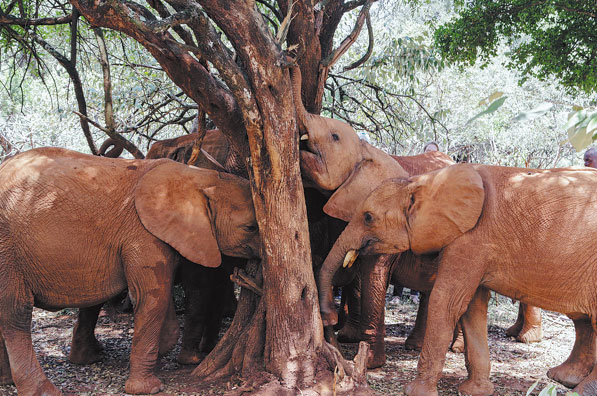Wildlife gain from community support


In his early days as a forest ranger, Hugues Akpona found himself being treated as an enemy by members of his own community who saw an anti-poaching law in Benin as a threat to their livelihoods.
"My own cousin would send me messages reading 'you who is supposed to understand why we are hunting, you are the one coming to arrest us and send us to jail'," said Akpona, now president of the Benin Rangers Association.
He even had to find a safe place to send his wife and children far away from the community in the face of threats. He was then a ranger at Pendjari National Park in the country's far northwest.
Despite Africa being the world's richest continent in terms of wildlife, its treasure trove of biological diversity has been suffering from rampant poaching, among other threats to the wildlife.
According to Save the Elephants, a UK charity based in Kenya, at least 33,000 elephants are killed for their tusks each year in Africa.
The elephant population is also at risk due to an accelerating rate of loss of habitat from farming and infrastructure development, leaving the giants of the forest with small patches of disconnected lands.
Also at risk are plant species. A report by Science Advances journal finds that a third of plant species in tropical Africa are threatened with extinction, largely as a result of human activities.
However, this trend can be reversed through the participation of communities in conservation efforts. Akpona said the connection between poverty and conservation should be better understood for tangible results to be realized.
Sixteen years after Akpona began work at Pendjari National Park, the neighboring community enthusiastically endorses the anti-poaching policies that he and others enforce at the park. The national park has become a wildlife tourism destination, taking in more than $600,000 in revenue each year.
"Significant investment has been made at the local community level, with the employment rate increasing more than tenfold over the last 15 years. The local economy has been transformed, and residents have embraced the value of protecting the natural environment," Akpona said.
Raphael Chiwindo, a senior ranger at Kasungu National Park, said his park - the second-largest national park in Malawi - as reaping the benefits of a policy of integrating the community into the conservation of the forests.
"For a long time, there had been a perception that to conserve nature, force had to be used. But conservationists have realized that if community members are not involved, the fight might not be won," Chiwindo said.


































